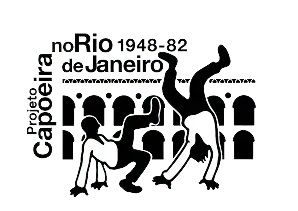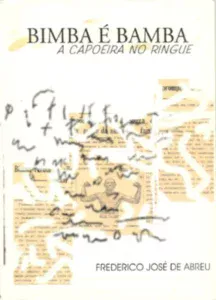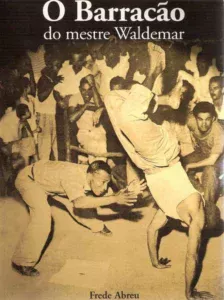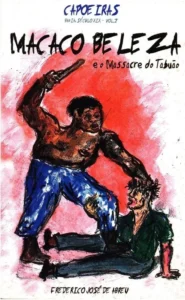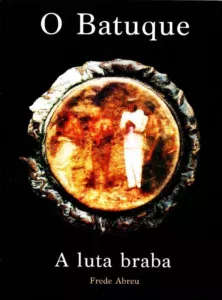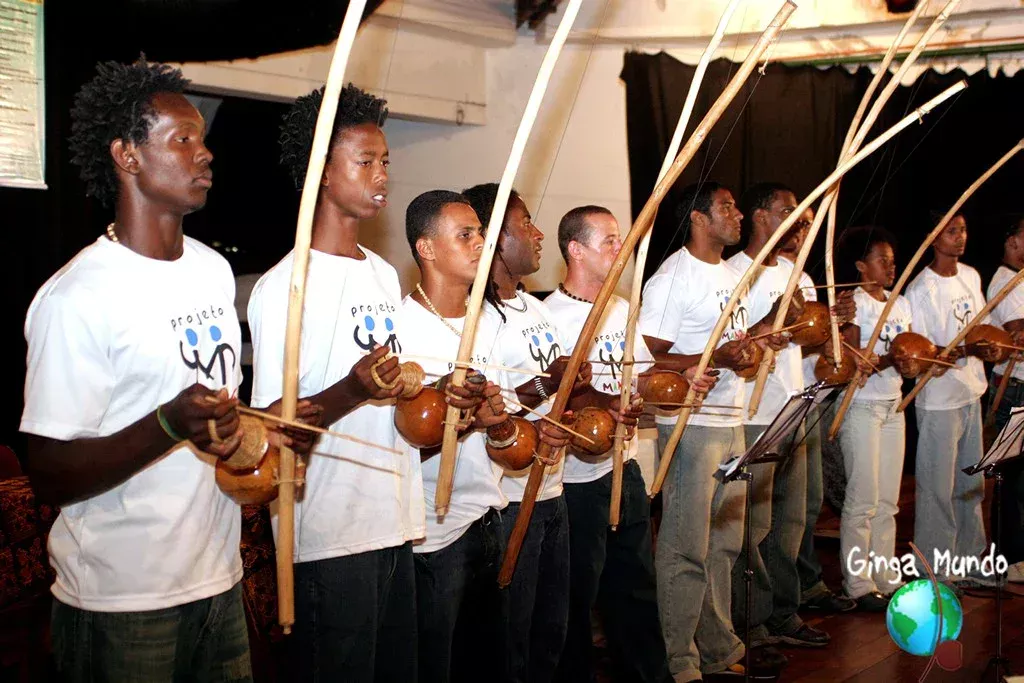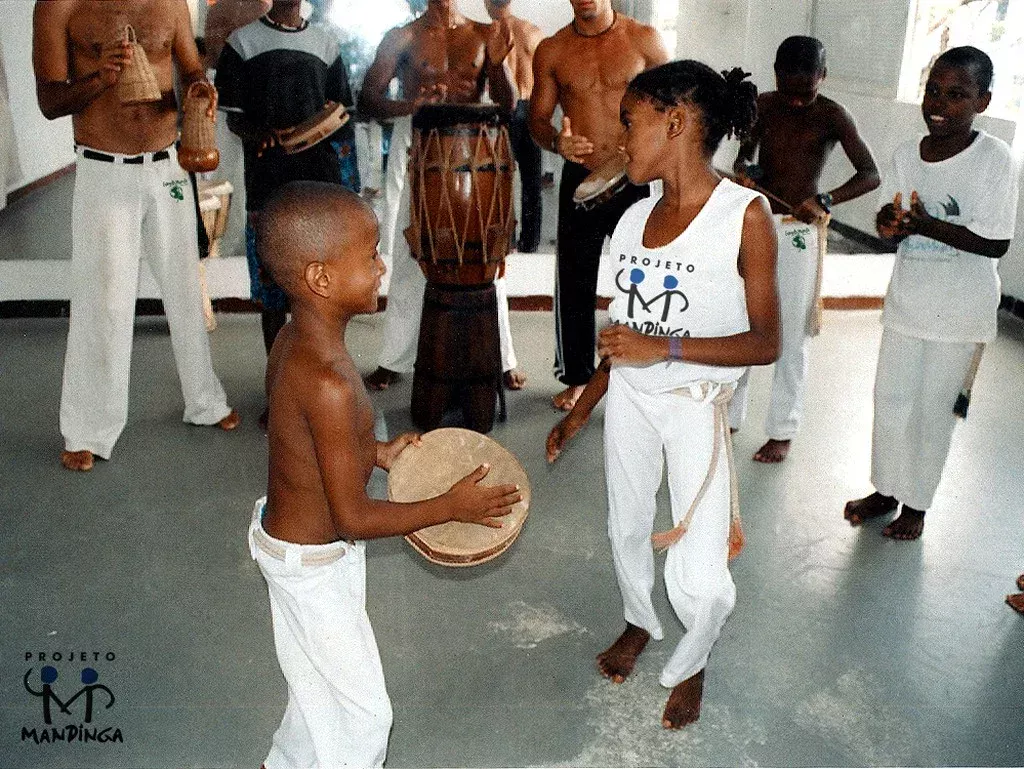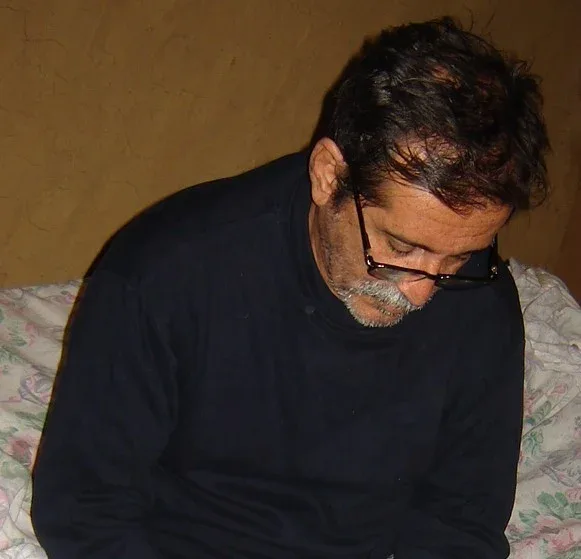By Maria Luísa Pimenta Neves.
Frederico José de Abreu (1946-2013), known in capoeira circles as Frede Abreu, was a native of Bahia who discovered and became involved with capoeira in the 70s. His training was in economics, but he worked in film and theater productions, as well as holding positions in institutions dedicated to popular culture, actively promoting capoeira and its many facets.
He is considered by the capoeira community to be a self-taught historian, a leading researcher and writer, as well as an active organizer and director of numerous actions that benefitted capoeira and capoeiristas in the 80s, 90s and first decade of the 2000s. Among his main actions was the creation of one of the largest capoeira archives in the world, with approximately 30,000 items, such as publications, manuscripts, objects and video recordings. Even today, Abreu is celebrated as a mentor to many of the great capoeira researchers, as well as to many capoeiristas. Together with Matthias Röhrig Assunção, he was a consultant of the Brazilian Institute of the National Artistic and Historical Heritage (IPHAN) for the Dossier 12: Capoeira Roda and the craft of Capoeira Master, the important cultural inventory for registering and safeguarding capoeira as Cultural Heritage in Brazil (2008).
In the same way, Frede was involved in setting up the João Pequeno de Pastinha Capoeira Angola Sports Center and the Mestre Bimba Foundation, institutions that are important for the preservation and dissemination of the legacy of the iconic masters Pastinha and Bimba. Together with Demerval dos Santos Machado, he was responsible for writing the speech given when the family of Manoel dos Reis Machado, Mestre Bimba, received in his name the posthumous honorary doctorate awarded by the Federal University of Bahia. These are just a few of the initiatives we have highlighted as representative of the plurality of Abreu’s work.
His career is also marked by actions to promote the visibility of capoeira and its masters at the Liceu de Artes e Ofícios da Bahia (1980s and 1990s); the creation and implementation of the Capoerê project in Salvador (1990s), when he worked at the Mauá Institute and established a partnership that boosted this project in terms of the professional valorization of capoeira masters and their apprentices; as well as the various socio-educational actions that took place at the Mandinga NGO, also in Salvador (in the first decade of the 2000s). The many aggregating actions promoted by Abreu gave a very diverse public access to capoeira, as well as involving everyone from renowned researchers to children attending so-called social projects in discussions on the subject that ended up being referenced in his research, action and personal library.
"Cup of Poison"
The text Cup of Poison: Reflections about Capoeira Bodies in the Educational Praxis of Frederico José de Abreu, which we have made available at the link of the title in its Portuguese original, is a master’s dissertation in the discipline of Education (PPGE/UFBA), and identifies aspects of Abreu’s action in the capoeira segment that show elements that are consistent with a socio-educational and cultural praxis of a humanist nature, which points towards a liberating and counter-hegemonic education. The concept of praxis that drives us is based on Paulo Freire. Our methodology focused on documentary, oral and image research into Frederico Abreu and his relationship with capoeira. We used documents that record Abreu’s actions, notes of our conversations and own experiences as researcher, as well as testimonies and interviews, in dialogue with popular capoeira masters, intellectuals working in education, capoeira research and tropicalist artists. We used part of Abreu’s extensive output as sources and found in his own texts the possibility of establishing a dialogue with what we consider to be indications of a humanist and educational approach. This researched universe made it possible to highlight (self)transforming and socio-educational potential that, in the context of capoeira, related to a plurality of ways of being, doing and interacting in the world, based on the experience of capoeiristas in different periods. Relationships led by bodies of capoeiristas who have peculiarities that are intrinsic to the social history of Brazil. We sought to understand how Frede related to this, or part of it, and how he perceived these relationships.
His work also includes images and tables created from the exercise of a methodological trait that Abreu used a lot in his work: through tables and images constantly inserted and accompanied by various comments in his writings, he made it easier for the reader/researcher to understand and access the questions and concerns that he led us through and invited us to reflect on the paths and interpretations (and even possible manipulations) of the history of capoeira.
Our study is made up of a presentation followed by four chapters and, firstly, we present the construct of this study: the methodology and the researchers and/or popular masters whose work served as a reference for our research, consisting mainly of Brazilian intellectuals with a focus on issues of blackness and the valorization of popular knowledge in dialogue with academic knowledge. Next, we present the research objectives and our central question: we propose a relationship of observation and search for understanding about so many codes/messages expressed or transmitted by capoeiras’ bodies and their political-pedagogical possibilities, from Abreu’s perspective and action. How did this action reverberate in capoeira circles during the period in which he was involved and active, from around 1976 to 2013? Our study refers to both the historical conception and the ways of being in the world perceived and evidenced by Abreu about these bodies. We reiterate that the verification of Abreu’s action as a praxis of an educational nature and meaning was prioritized in our work.
In the second chapter, we searched for and recorded biographical elements about Frederico Abreu. Our contribution sought to achieve consistency of information, but we understand that we did not cover some aspects of Abreu’s intense journey and, given the certain difficulty we encountered in organizing chronologically or systematically Abreu’s involvement and work within capoeira culture and its authors or characters, we believe that further work will be necessary. In this chapter we also present, in chronological order, the work published or authored by Frede Abreu. We would like to point out that our work was carried out during the Sars Covid-19 pandemic (2020 and 2021), under social distancing measures, which caused some decisions to be made that were not those that had initially been planned.
The Capoerê project got off the ground and today works as a disseminating network, and which trains multiplier agents in its nuclei in Salvador.
The Mandinga NGO, in the first decade of the 2000s, disposed of a venue run by Mestre Sabiá, which hosted the activities of the capoeira group Gingamundo, the Jair Moura Institute (Abreu’s collection was available for consultation, including activities such as the Mestre Noronha Study Group). Abreu contributed to the creation and pedagogical coordination of the project, and for almost a decade, ‘Vadeia Menino Vadeia’ moved the local community and much of Salvador’s capoeira scene.
In the fourth chapter, we revisit the central question of the dissertation, its developments and objectives, and provide final considerations and notes on the research. We consider it important to highlight the three interviews with Frede Abreu used in the dissertation. They were carried out by researchers Lang Liu, Ana Marcílio and Luis Vitor Castro Júnior, when they were doing field research for their own academic work. These interviews are part of the author’s archive, as well as those of the interviewers, and are not published in the appendices of the work because they still need to be better transcribed. The interviews include Abreu’s voice as an active participant in the research, once again following the methodological pattern of his work: it was his habit to emphasize the importance of direct or indirect narratives from popular mestres or characters who were at work in the many periods and contexts of capoeira. It is also important to thank Elza de Abreu, Mestre KK Bonates, Mestre Sabiá, Mestra Patrícia and Mestre Nenel, for the generosity with which, at some point in the weaving of the body of our work, they contributed greatly to its realization. Our sincere gratitude goes to Prof. Dr. Maria Cecília de Paula, the supervisor of this research.
We play with the non-dichotomous or contradictory shape of capoeira in the title of this work, when we symbolize capoeira as a ” cup of poison” (also in allusion to the reality of the pandemic, understanding the relevance of using poison from venomous animals to create serums, as well as the virus to create the vaccine against covid-19). We therefore draw attention to the possibility of thinking about and proposing the highlighting and understanding of the controversial contexts of capoeira’s history and characters as a possible way of fostering debate about the constitution of powerful, multifaceted and reexistent pedagogies in capoeira, which has made the promised “round the world trip” sung and spoken about by so many practitioners and thus continues to expand and be recognized as a socio-educational tool far beyond Brazil.
We emphasize that it is the premise of this research to pay tribute to the life and work of Frede Abreu and we reiterate our intention to continue working towards access to the contributions and visibility of this capoeira researcher, so that new generations don’t lose sight of the importance of his dedication and the realization of so many initiatives for the valorization of capoeira and, above all, of capoeiristas. He is a prominent member of the gallery of lives dedicated to making the many powerful facets of capoeira visible.
Works by Frede Abreu, translated by Lilu, available in Portuguese/English editions:
Abreu, Frederico José de. O Batuque: a luta braba. Salvador: Instituto Jair Moura, 2013.
Abreu, Frederico José de, e DOWNEY, Greg (orgs) Mestre Pastinha: Como eu Penso? Despeitados? Salvador: Instituto Jair Moura e Capoeira, 2013.
Abreu, Frederico José de. (org) Improvisos de Pastinha. Salvador: Instituto Jair Moura, 2013.
